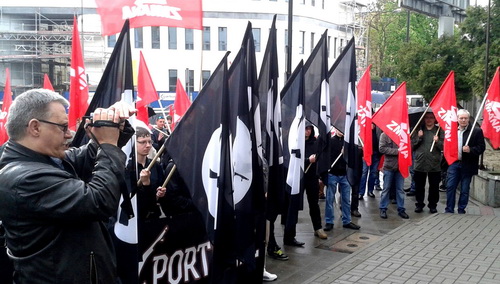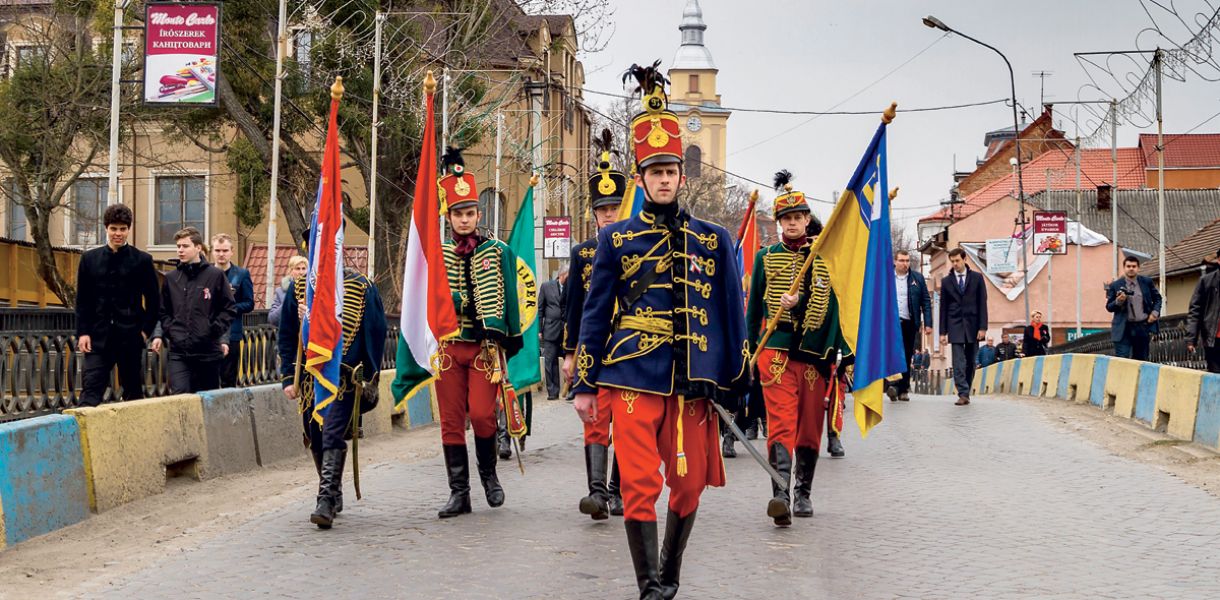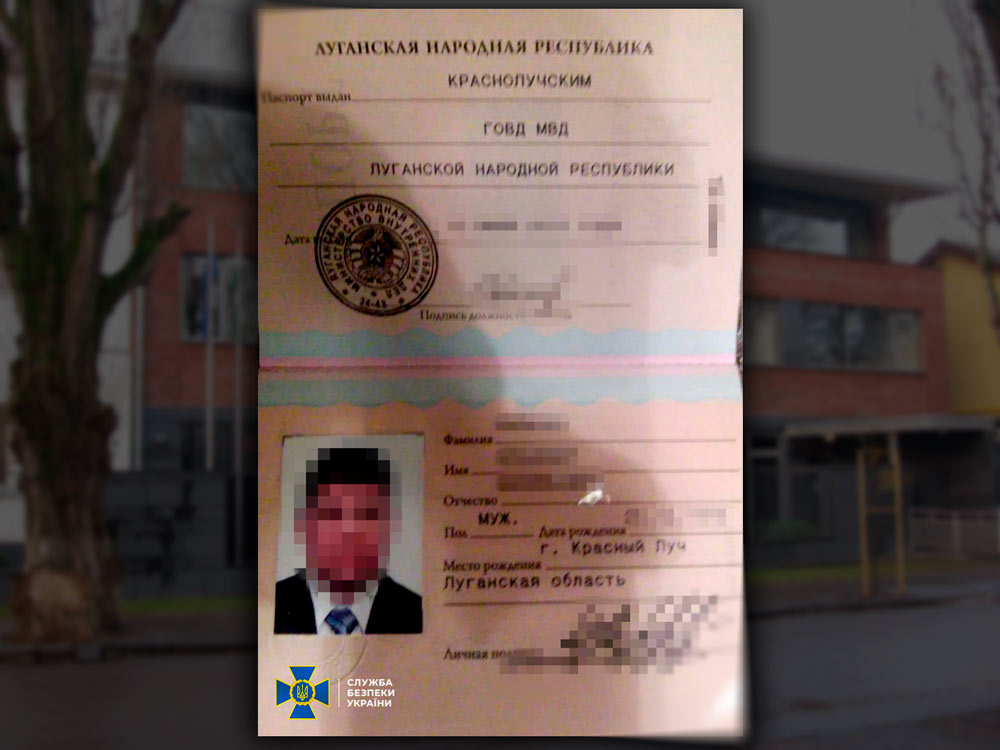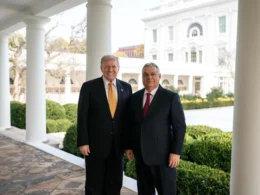Now the Polish suspects are to be tried on terrorism charges, the Polish outlet TVP.info reports. Intriguingly, they were directed by a German journalist. Far-right researcher Anton Shekhovtsov says he knows the identity of this man.
Since Russia unleashed its hybrid war on Ukraine back in 2014, it has been trying various means to weaken Ukraine and force the Russian agenda, ranging from the staged protests and provocations within Ukraine to back the pushed propaganda narratives, throughout diplomatic efforts to bury Ukraine in the international arena, up to the hot war in the east of Ukraine.
The efforts to incite and boost tensions between Ukraine and its EU neighbors have been among the priorities. Most of such attempts were directed at undermining the Ukrainian-Polish relationships. However, Hungary has also been at the top of the list.
In February 2018, there were two attempts to set on fire the Zakarpattia Society of Hungarian Culture in the city of Uzhhorod, the westernmost regional capital of Ukraine. The first attempt took place on 4 February 2018. The second try on 27 February 2018 reached its goal and 25 m² of the ground floor burned down. Fortunately, no one was hurt by the arsons.
Poland's Internal Security Agency (ABW) detained three Polish nationals shortly after the first incident as perpetrators of the attack. Later, Ukrainian police arrested three Ukrainians suspected of the second attack and put an alleged "foreign perpetrator" on the search list.
Now the Polish suspects are to be tried on terrorism charges, the Polish outlet TVP.info reports.
According to the report of the Polish news portal TVP.info, the three Polish citizens connected "to radical right-wing groups" are going to face terrorism charges after the Prosecutor's Office has filed the indictment in their case to court.
The Mazovian Voivodeship regional Organized Crime and Corruption Investigation Division of the National Public Prosecutor's Office together with the ABW investigated that the organizer received EUR 500, and paid 1000 PLN (about $270) to each of two direct perpetrators. The findings of investigators show that a German journalist ordered the attack, probably "acting for the benefit of the Russian special services." TVP.info hasn't disclosed the name of the journalist.
TVP.info cites an ABW officer explaining who gained from the staged crimes and why the Polish perpetrators were used:
"This provocation was supposed to lead to the deterioration of Ukrainian-Hungarian relations. And such a development played into Russia's hands, which is interested in the destabilization of its western neighbor, where the hybrid war in Donbas is already underway. And hiring the Polish thugs was beneficial for Russia because in case of the failure of the contractors it was possible to antagonize the relationship between Poles and Ukrainians, which are not the best anyway," the ABW officer told TVP.nfo.
Investigation finds
The main accused is dubbed as "28-year-old Michał P., a security specialist with higher education." According to investigators, he had ties with the Falanga neo-fascist organization and the pro-Russian far-left party Zmiana (Change).
A joint demonstration of far-right Falanga together with far-left Zmiana.
The suspect can be identified as Michał Prokopowicz, a co-founder of the Falanga movement, which maintains close ties with the Kremlin and its puppet republics in the Donbas. According to Shekhovtsov, Falanga was for some time led by Bartosz Bekier, a fan of Putin and Assad and supporter of the Russia-backed “republics” in Eastern Ukraine. “Zmiana” was founded by Mateusz Piskorski, a long-time far-right politician who has been under arrest in Poland since May 2016. Piskorski is under arrest on suspicion of spying for Russia and China.
Read more: Pro-Russian activism of Mateusz Piskorski, detained in Poland
The indictment of "Michał P." reads, "In January and February 2018, in order to obtain financial gain, he ordered to conduct illegal acts in Ukraine involving nationality-based public hatred between citizens of Ukraine and Hungary." The suspect had "handed over to Adrian M. and Tomasz Sz., PLN 1000 for the purchase of fuel to set fire to the building" of the Hungarian Center in Uzhhorod "with the intention to fund a terrorist offense of painting fascist symbols and setting fire to a social organization building."
The alleged direct performers of the arson attack mentioned as "Adrian M." and "Tomasz Sz." in the indictment were named by Zakarpattia Governor Hennadii Moskal weeks after the attack. They were Adrian Marglewski and Tomasz Szimkowiak, two other members of Falanga. Marglewski has pleaded guilty; Prokopowicz and Szimkowiak have not.
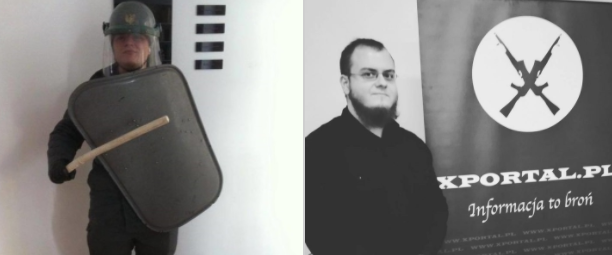
Adrian Marglewski (left) and Tomasz Rafal Szimkowiak (right). Photo: novynarnia.com
Recruiting Adrian Marglewski, Michał P. told him that the action was aimed at discrediting the "Ukrainian Banderites." Before setting the cultural center on fire, a swastika had to be painted there, as well as the number "88" (neo-Nazi code for "Heil Hitler - as "H" is the eight letter in the alphabet). The arson was to be videotaped.
Altogether, Marglewski was to recruit five implementers from the neo-Nazi Falanga, but he only found two.
Although the Polish publication has not revealed the name of the German journalist who ordered the attack, researcher of the European far-right Anton Shekhovtsov has supposed that he is actually Manuel Ochsenreiter, the editor of the German far-right magazine “Zuerst!”.
But I have been investigating these people for years now (https://t.co/4PsbsEX0Da) and can make an informed guess. I suspect that the German journalist involved in the anti-Ukrainian false-flag op was Manuel Ochsenreiter, the editor of the German far-right magazine “Zuerst!”. /8
— Anton Shekhovtsov ✚ shekhovtsov.bsky.social (@A_SHEKH0VTS0V) January 6, 2019
Ochsenreiter is a frequent guest of the Russian state-controlled channels Pervyi Kanal and Russia Today, where he engages in anti-Ukrainian propaganda, a friend of Oleksandr Dugin, and has been a "German observer" at the illegitimate elections of Russia's puppet "republics" in eastern Ukraine, as well as a frequent guest in occupied Crimea. Shekhovtsov bases his guess on the long-time connections between the German journalist and Mateusz Piskorsky, who have been collaborating for over five years.
"Mateusz Piskorski, for instance, invited Ochsenreiter to observe the so-called 'referendum' in Crimea in March 2014 [an illegitimate plebiscite which Russia utilized to secure its grip over occupied Crimea - Ed]. They traveled together, for instance, to Syria. They took part in several joint events, collaborated very closely. Last year, German journalists wrote about these connections between Ochsenreiter and Piskorski, calling the former the 'conductor of Kremlin influence in Germany.' Ochsenreiter was also acquainted with Prokopowicz, i.e. with the person that instructed the two smaller Falanga activists before the operation in Ukraine," Shekhovtsov told RFE/RL.
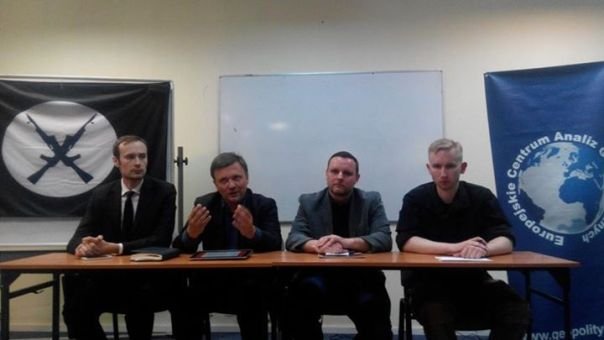
RFE/RL has contacted Ochsenreiter in social media, asking him whether was implicated in the arson. Ochsenreiter denied, but then made his Facebook profile, which showed he was friends with Szimkowiak, one of the suspects, only accessible to friends after being asked whether he knew anybody from the arson.
Both attacks on the Hungarian Center took place amid the Hungarian row with Ukraine around the new Ukrainian education law. Stating that the law violates the rights of the Hungarian national minority in Ukraine, Hungary keeps blocking the Ukrainian EU and NATO aspirations.
In total in February 2018, the Security Service of Ukraine recorded 12 instances "of the sabotage activities of the Russian special services, the arson of the of the Zakarpattia Society of Hungarian Culture among them."
Although some Ukrainian officials have called the arson a Kremlin operation, Shekhovtsov advises not to jump to conclusions too early, claiming that pro-Russian actors in Europe often do things on their own initiative, knowing they will be rewarded by Russia later.
Read more on the attacks on the Hungarian Center in Uzhhorod:
- Putin’s Falanga: meet the Polish neo-fascists who tried to burn down a Hungarian center in Ukraine
- Polish pro-Russian far-right radicals behind arson attempt of Hungarian center in Ukraine
Read also:
- Ukraine’s law enforcers bust gang plotting to blow up Hungarian monuments
- Ukraine’s new education law unleashes international storm over minority language status
- Experts weigh in on Ukraine’s hotly debated new minority language policy
- Ukraine and Hungary both claim victory in Ukrainian education language argument
- Separatism Transcarpathian style: is Hungary aiming to grab a part of Ukraine?
- Hungary openly helping Putin destabilize Ukraine
- Spoiling Ukrainian-Polish relations: next phase in Kremlin’s hybrid war
- Attack on Poland’s Consulate General in Northwestern Ukraine seen as provocation
- Polish & Ukrainian intellectuals: confrontation between our nations leads to joint destruction
- Kyiv’s hold on Polish politics: why anti-Ukrainian rhetoric in Poland will grow stronger
- How Hungary became a weapon of Russian disinformation
- Hungary has stabbed us in the back, says Ukrainian political scientist
- Hungary openly helping Putin destabilize Ukraine


